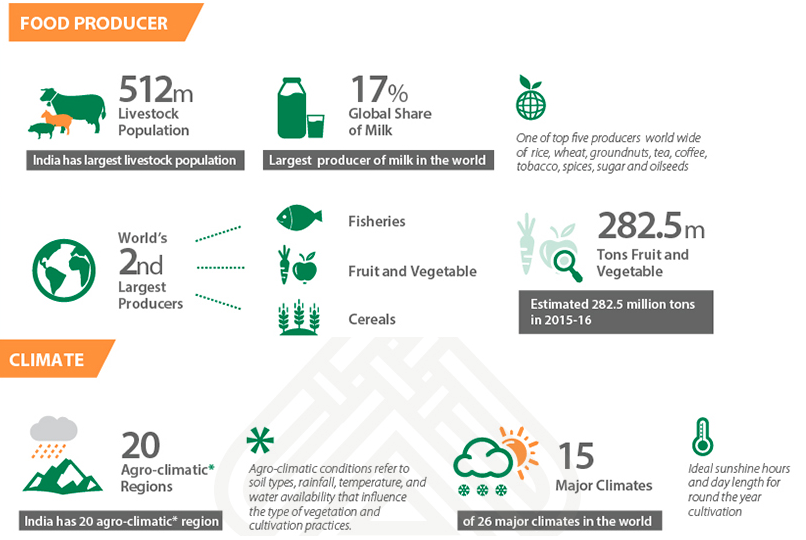Agriculture
India’s Food Processing Industry
- 16 Apr 2020
- 7 min read
This article is based on “Hungry for more” which was published in Business Standard on 16/04/2020. It talks about challenges and steps to be taken in India’s food processing Industry.
Worldwide government’s have imposed social distancing and lockdown in order to deal with the Covid-19 pandemic. This lockdown scenario has highlighted the importance of processed food, especially in the urban areas.
Irrespective of the current crisis, the food processing industry (FPI) is always of enormous significance as it provides vital linkages and synergies among all the sectors of the economy viz. Primary (agriculture), Secondary (industry) and Tertiary (Transportation of goods, R & D in Agro processing).
Food processing provides an opportunity to utilise excess production efficiently. Not just from an agricultural growth perspective, but it is also important for reducing food wastage as it increases shelf life and enhances quality.
Thus, food processing has become an integral part of the food supply chain in the global economy, and India has also seen growth in this sector in the last few years.
FPI is recognised as the ‘Sunrise Industry' in India. However, the industry faces a lot of challenges.
Challenges Faced by Food Processing Industry In India
- Supply and Demand Side Bottlenecks
- Small and dispersed marketable surplus due to fragmented holdings, low farm productivity due to lack of mechanization, high seasonality, perishability and lack of proper intermediation (supply chain) result in lack of availability of raw material. This in turn, impedes food processing and its exports.
- Demand of processed food is mainly restricted to urban areas of India.
- Infrastructure Bottlenecks
- More than 30% of the produce from farm gate is lost due to inadequate cold chain infrastructure.
- The NITI Aayog cited a study that estimated annual post-harvest losses close to Rs 90,000 crore.
- Lack of all weather roads and connectivity make supply erratic.
- Informalization in Food Processing Industry
- The food processing industry has a high concentration of unorganised segments, representing almost 75% across all product categories. Thus, causes the inefficiencies in the existing production system.
- Deficiencies in the Regulatory Environment:
- There are numerous laws, under the jurisdiction of different ministries and departments, which govern food safety and packaging.
- The multiplicity of legislation and administrative delays leads to contradictions in food safety specifications and guidelines.
- Low-Value Exports: Further, most processing in India can be classified as primary processing, which has lower value-addition compared to secondary processing.
- Due to this, despite India being one of the largest producers of agricultural commodities in the world, agricultural exports as a share of GDP are fairly low in India relative to the rest of the world.
- The same proportion is around 4% for Brazil, 7% for Argentina, 9% for Thailand, while for India it is just 2%.
- Besides these, issues like mounting cost of finance, lack of skilled and trained manpower, inadequate quality control and packaging units and high taxes and duties, thwart development of FPI.
Note:
Processing can be delineated into primary and secondary processing.
- Rice, sugar, edible oil and flour mills are examples of primary processing.
- Secondary processing includes the processing of fruits and vegetables, dairy, bakery, chocolates and other items.
Steps To Be Taken
- Hand-Holding Approach
- Government should adopt a hand-holding approach by establishing risk sharing mechanisms, fiscal incentives and partnership models for creation of infrastructure for logistics, storage and processing.
- In this context, the government has launched the Pradhan Mantri Kisan Sampada Yojana, aimed at bridging the infrastructure gap.
- Also, 100% foreign direct investment in food processing units has been allowed.
- Streamlining the Regulatory Structure: There is a need to foster development of backward linkages crucial for securing scale and economic viability by evolving conducive regulatory framework for contract and corporate farming and encouraging commodity clusters and intensive livestock rearing.
- The Strategy for New India @ 75 recommends that states take the lead in passing Model Contract Farming Act, 2018.
- Remove impediments of multiple departments and laws in seeking approvals by bringing them under a single window.
- Ensure proper agricultural marketing reforms e.g. by uniform implementation of the APMC act.
Note:
According to the Model Contract Farming Act, 2018, the contract will specify the quantity, quality and price of produce being supplied. This would shield farmers from price volatility, subject to quality commitments.
- Human Resource Development
- Skilling is required at two levels. First at the farm gate in promoting agricultural best practices and second, in processing activities.
- The National Skill Development Corporation (NSDC) estimated the need to skill 17.8 million persons in the food processing industry by 2022.
- In this pursuit, industry, academia and government should put in combined efforts for development of specialized institutes and courses in food packaging, processing, bio-technology, and such allied fields.
- Promoting Village-Level Procurement: The NITI Aayog, in the Strategy for New India @ 75 document, recommended village-level procurement centres for perishables such as fruits, vegetables and dairy.
- In this context, the upgrading of 22,000 rural haats into Gramin Agriculture Markets (GrAMS), announced in the 2018-19 Budget, was a step in the right direction.
Conclusion
The need today is to treat food processing as part of the overall food sector and provide all the facilities, exemptions, and concessions as available to agriculture and related activities. Food processing industry will not only serve the nutritional needs of New India but it will also act as an important link in doubling the farmer’s income.
|
Drishti Mains Question How India can utilize the untapped potential of the Food Processing Industry? |







